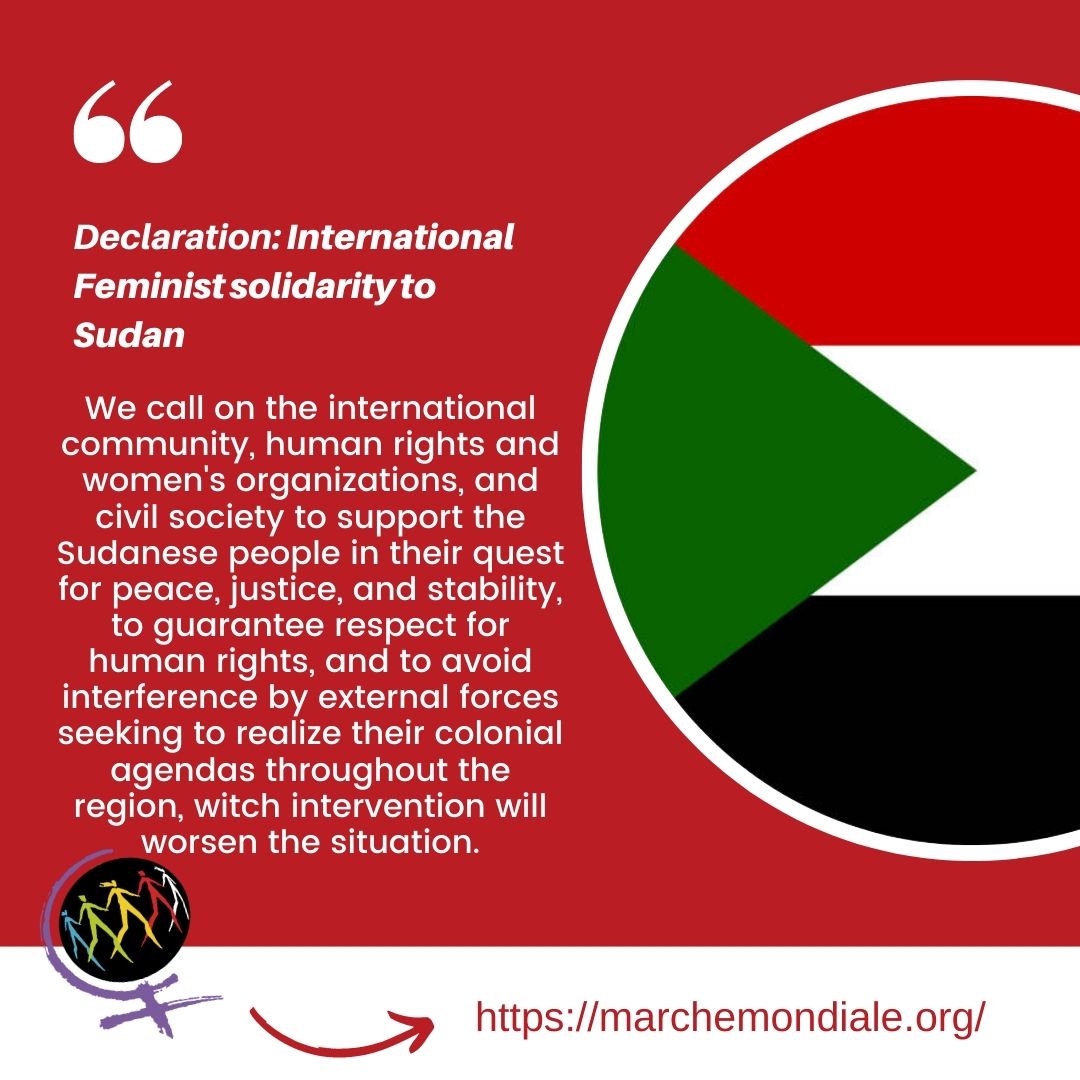WMW Statement – International Feminist Solidarity to Sudan
the World March of Women is following with great concern the crisis in Sudan due to the fighting and violence between the military forces and the Rapid Support Forces, which have resulted in many deaths among civilians. This number should be much higher on the ground with the bodies scattered around the streets, which have not yet been included in official statistics. The situation is challenging due to the high prices of raw materials and commodities. While citizens have no access to their savings, purchasing power has decreased. Thousands of immigrants are heading to other regions inside and outside Sudanthe World March of Women is following with greater concern the deterioration of health infrastructure, as nearly 70% of hospitals have been destroyed. The rest are about to close due to a lack of medical staff and health supplies, water and electricity cuts, and a reduction in the use of internet and telephones. Cases of ambulances that conflicting forces have attacked and are not allowed to pass were monitored.
Due to the persistent failure of the state to fulfill its duty to protect civilians and provide them with health and humanitarian assistance, we strongly condemn the ongoing war in Sudan and express our solidarity with the Sudanese people. We also condemn the sowing of hatred between the peoples of the same country and the fuelling of conflicts to replace and empower transnational corporations.
- We call on the international community to intensify its efforts to bring peace to Sudan and to adhere to the ongoing armistice fully
- We insist on providing safe passage to rescue the wounded and supply them with food and medical supplies.
- We drew attention to the psychological trauma inflicted by this war on civilians, especially women, and children, and we call on all parties to consider women’s needs and rights.
- We call for the government to take full responsibility for war crimes against women, including murder, rape, and displacement. We insist on respecting international conventions to protect them from sexual violence, forced prostitution, and all forms of abuse and violence.
- We express our full support and solidarity with feminist movements in Sudan, fighting for women’s rights and dignity. We value their struggle and active participation in revolutions and the uprising of democratic change to overthrow the dictatorship and establish a civilian government.
- We recall the crucial role of women in calming the situation and rebuilding local communities in conflict crises. We emphasize the need to secure their physical and psychological safety to enable them to participate in political life and achieve democracy in Sudan.
- Finally, we call on the international community, human rights and women’s organizations, and civil society to support the Sudanese people in their quest for peace, justice, and stability, to guarantee respect for human rights, and to avoid interference by external forces seeking to realize their colonial agendas throughout the region, which intervention will worsen the situation.
Long live the struggles of the people!
Long live the struggles of women!
You can listen to our sister Omayma who is a member of WMW Sudan, via this link;
She also adds that:
I wanted to clarify the effect of the war specifically on women in Sudan. Most of women are very poor and immigrating from a region to another and working in the informal sector within a total insecure conditions. They sell drinks , sandwiches or some paper tissue on the road collecting a day to day living costs. So, this war made life more difficult for women to earn their livelihood through scarcity of products to sell.
In addition to that, some women and girls have been taken hostage for days without food or drink in some areas that witness severe gunfire. The situation is very bad in the health sector after the complete destruction of the infrastructure of hospitals and health units. And there is a statistic that says that 25,000 pregnant women were unable to reach hospitals to follow up on childbirth.There are no medicines and basic health care supplies for the wounded in the clashes.Schools are closed and teaching is completely suspended.Banks are closed and women who depend on small loans for their livelihood cannot work anymore. Especially since basic resources and commodities are no longer available in the market, we are experiencing high prices, and the growth of the black market. Women suffer also from dispersal of family members, as some of them were trapped in areas where clashes took place because they went to work there or to visit their families.
The psychological suffering experienced by women is very severe, especially with the high level of violence and killing. There is a collective trauma especially among women.The situation in general is very bad and worse for women who are trapped in their homes or in university hostels or in some isolated areas without work or a monthly or daily income to secure food and drink.

